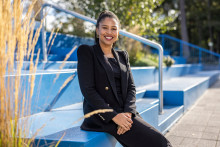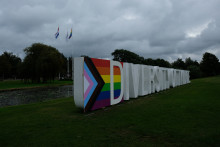A participant at a recent Th!nk with Pride event rated UT’s inclusivity an 8 out of 10. Where does UT currently stand when it comes to DEI?
‘Really? That’s great news. But of course, that’s just one person’s opinion. Someone with a different background or facing different challenges might have a completely different experience. Ideally, how nice would it be to look around in a little while and think, ‘Things are truly going well here – time to apply for a new job.’ In short: we’re making progress together, but we’re not there yet. It’s mostly about encouraging open conversations and building mutual understanding. It’s also about feeling seen and heard — because no two people are the same. That diversity is something we can truly benefit from.’
What does the new framework entail?
‘To be clear: it’s not entirely new, but rather a refinement of earlier policy, for the next five years. Earlier this year, we invited as many people at UT as possible to contribute their thoughts on how DEI fits into their everyday work and how we might support them. That input led to long-term recommendations. The framework offers guidelines for how we, as the UT community, want to interact and work together in all our diversity over the next five years.’
Can you elaborate on the contents?
‘The framework consists of two core elements: behaviour and policy. The first provides guidance on how we interact with one another and what to do in case of conflict or unsafe situations. The second focuses on shaping our institutional policies so that UT is a safe space where everyone can be themselves. It’s not something to be awkwardly forced into every discussion, but rather a mindset we adopt from the outset.’
What does that mean in practice?
‘Far too much to list in full, but to start: these two components have been tailored to staff, students, researchers, educators and communication. For staff, it means that managers will receive training in inclusion and safety, and HR will continue to recruit with diversity in mind. We also remain committed to increasing the number of women in top-level positions.’
‘For students, we’re working with the Student Union and associations to embed the theme into their statutes. By 2026, a more inclusive student policy will be introduced, with added attention for students with disabilities or personal circumstances. We’re also clarifying where people can go to report complaints or incidents of inappropriate behaviour. Lecturers can contact us for advice on inclusive teaching methods, and researchers are encouraged to shape their funding applications and research teams according to DEI principles. Across the university, managers will receive a new, more inclusive style guide.’
Your last team member recently moved on to a new role. How will you manage everything on your own?
‘That was something the University Council rightly raised. But the good news is: I’m not doing this alone. People across the entire university helped shape this plan. Even Executive Board President Vinod Subramaniam has expressed how important he finds this topic. The whole point is that the framework offers guidance to all groups — students, staff, researchers, and support services alike. So I’m not the one solely responsible for implementation. That’s a shared responsibility. That said, I do have to set priorities within the current limitations — such as celebrating successes and conducting an annual review to see how we’re progressing.’
You call yourself a Diversity, Equity & Inclusion Officer. Doesn’t that sound a bit like the thought police?
‘Oh! I’ve never looked at it that way before! But no, that’s certainly not the intention. We’re not here to wag fingers or patrol people’s behaviour. There’s a common complaint — especially from the US — that this topic receives disproportionate attention and is being forced upon people. But at its core, doesn’t everyone just want to be able to be themselves? That also applies to people who don’t necessarily fit neatly within current social norms. That’s what it’s all about — not imposing anything, but raising awareness and understanding of one another’s backgrounds.’






